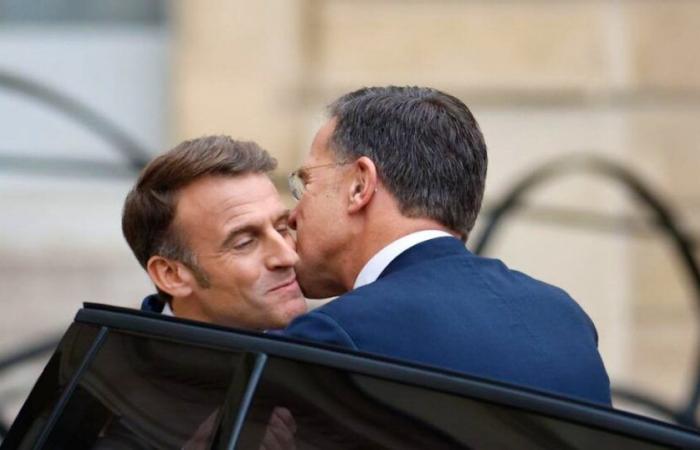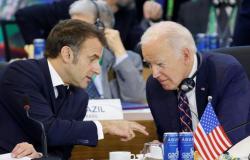The head of American diplomacy Antony Blinken goes to Brussels on Tuesday for emergency talks with Europeans in an attempt to speed up aid to Ukraine before President-elect Donald Trump comes to power.
ATS
The Secretary of State will meet with NATO and European Union officials on Wednesday “to discuss support for Ukraine in its defense against Russian aggression,” his spokesperson Matthew Miller said in a statement. .
Mr. Blinken’s trip very much resembles an emergency trip to the Belgian and European capital, against a backdrop of concerns from Ukraine and a number of capitals on the Old Continent about the sustainability of support for kyiv after the re-election of Mr. Trump on November 5, to which is added a political crisis in Germany.
The former President of the United States (2017-2021), who will return to the White House on January 20, is already in action: he spoke with Ukrainian President Volodymyr Zelensky, as well as with President Russian Vladimir Putin to ask him not to provoke an escalation in the war, according to the Washington Post.
But the Kremlin denied that the two men spoke to each other, a “pure invention” according to Moscow.
Donald Trump is also preparing, according to the American press, to appoint the influential Florida senator Marco Rubio as his secretary of state. The latter recently estimated that “we must end” the war in Ukraine, in an “impasse” according to him.
End of the war “in one day”
The 78-year-old tycoon has regularly claimed he could end the war “in one day” even before taking office, without ever detailing how he would go about it.
But he questioned the tens of billions of dollars spent by Washington on Ukraine, more than $60 billion in military aid since the Russian invasion in February 2022.
Outgoing President Joe Biden therefore wants to accelerate the delivery of military aid to Ukraine and continue to put in place mechanisms so that the Europeans take over.
There remains of the envelope voted in the spring up to 9.2 billion dollars to be allocated, including 7.1 billion to draw from American arms stocks and 2.1 billion to finance arms purchase contracts, according to the Pentagon.
White House National Security Advisor Jake Sullivan raised the sum of six billion dollars on Sunday and warned of the risks of a cessation of support from the United States.
“By the end of the (outgoing) administration, they will try to ship everything that is available,” such as armored vehicles and small arms ammunition, “that Ukraine needs and that the United States- United have in large quantities,” Mark Cancian, of the Center for International and Strategic Studies (CSIS) in Washington, told AFP.
Europeans under pressure
While Berlin is in the midst of a political crisis, German Foreign Minister Annalena Baerbock has warned of the risk of seeing Vladimir Putin taking advantage of the political transition in the United States to push his advantage in Ukraine.
Everything that Europe can bring to Ukraine “must be mobilized now”, declared the minister, insisting on strengthening the country’s anti-aircraft defense.
French President Emmanuel Macron and NATO Secretary General Mark Rutte called on Tuesday in Paris to maintain resolute military support for Ukraine while the election of Donald Trump in the United States casts doubt on the continuation of the American aid to kyiv.
“Support for this country attacked by Russia remains an absolute priority,” the French head of state told the press before a working lunch with Mr. Rutte.
“The recent deployment of North Koreans to the front line is a serious escalation. And we will continue to advocate for NATO and its allies to provide their full support to the Ukrainian army for as long as it takes,” he added.
For the French president, “this is the only path to negotiations. And I want to be clear, when the time comes, nothing will have to be decided on Ukraine without the Ukrainians, nor on Europe without the Europeans.
Alongside Emmanuel Macron, the new NATO Secretary General on Tuesday called on the West to “do more than just allow Ukraine to fight”.
“We must maintain the strength of our transatlantic alliance. The immediate challenge we face is supporting Ukraine, which is “preparing for its hardest winter” since the Russian invasion began in February 2022, he added.
North Korean support for Moscow illustrates the need for support from the United States, whose own security is in question, according to him.
The French president repeated the importance in his eyes of building a “European pillar of our transatlantic security”. “This is also what is rightly expected by the American administration from the Europeans within the Alliance,” he said.
Room for maneuver
Mr. Blinken’s visit, whose margin of maneuver is very narrow until January 20, comes as drone attacks on an unprecedented scale targeted Ukraine and the Moscow region last weekend, and thousands of North Korean troops amass in the Russian border region of Kursk.
The New York Times claimed that Moscow had massed 50,000 soldiers, including North Koreans, to try to dislodge the Ukrainian troops who had controlled this part of the Kursk region for three months.
“Whatever approach American leaders adopt towards Ukraine, Europe will have to mobilize and take the lead in Ukraine’s defense efforts,” Olena Prokopenko of the German Marshall Fund recently assured. , a transatlantic research center.
“Unfortunately, Donald Trump’s victory comes at arguably the worst possible time regarding the political and economic state of Europe and its ability to coordinate quickly,” she added.
In Brussels, there is also fear that EU members will treat the next Trump administration bilaterally, which would further weaken the European Union, she notes.
vf






